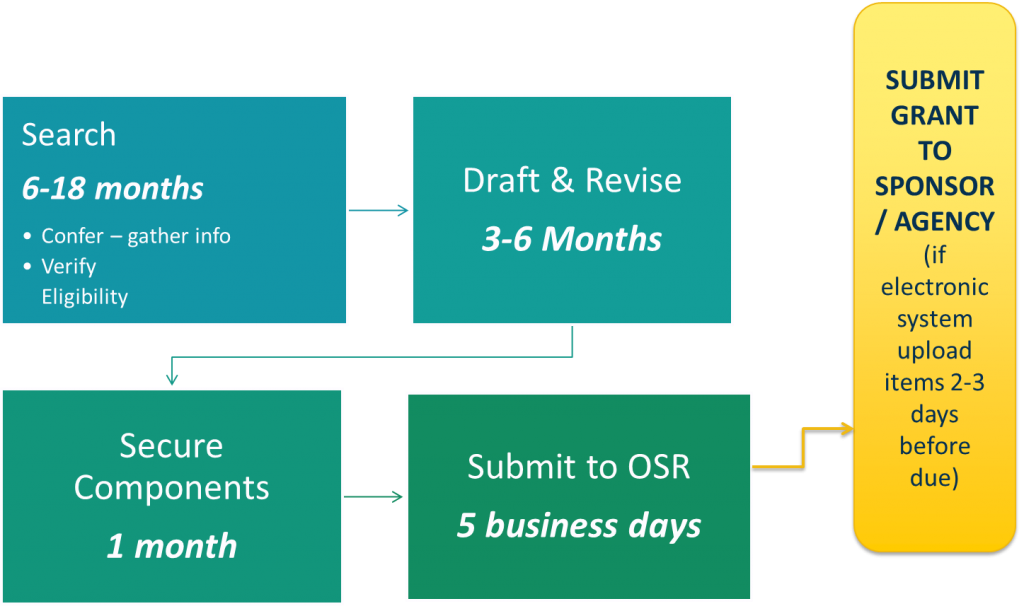Grant Basics
On this page:
Grant Search and Submission Timeline:
This is a general timeline to assist postdoctoral researchers with searching for, preparing and submitting sponsored research grants.
What is Sponsored Research?
Grants and Awards that require financial compliance reporting are considered “sponsored research” and must be reviewed, verified, and approved by the Office of Sponsored Research (OSR). These funds are typically paid to the recipient through the University.
What if I am applying for a fellowship or a grant that does not require such reporting?
If the grant/award you are preparing does not require review by OSR, this timeline can assist you with general thinking about successful search and application timelines. These grant / award funds are typically paid directly to the recipient.
How do I know if I should apply to a particular grant as a Principle Investigator (PI) or as a Co-Investigator (CoI)?
Below is an overview of what different roles are in grant / funding frameworks. These “grant roles” can help you to understand how you relate to a project in each area and what your participation on grants means in relationship to your workflow. A printable version of this framework is available here.
Principle Investigator:
Responsible for entire research project/program including all compliance requirements, reporting, hiring, staff management and training of junior researchers, budget management, costs, and outcomes.
- Runs the research project or program in its entirety
- Faculty (senior, mid, or junior depending on grant opp)
Co-Investigator:
Contributes own work and research to the project and to overall research development long-term.
- Develops research ideas or methods
- Faculty or advanced postdoc
Researcher:
Associate or consultant research staff that supports project research completion.
- Supports the completion of othersʼ research
- Postdoc (or advanced graduate training)
Grant Submission Timeline Overview

Breaking It Down:
Submitting grants is a process that includes 1) Searching for funding, 2) Preparing your application package, and 3) Submitting your application. Below are quick charts that help define each step of the process. A full presentation of these materials is available.
Searching for Funding
Search
- 6-18 months PRIOR to when you need funding:
- Look at the COS Pivot Database (there are trainings available for this system).
- Look at other available funding resources (databases, Google, funding notices, publications thanking founders).
Confer
- Talk to other postdocs about funding opportunities they know about or have been successful winning.
- Talk to your mentor, other advisors, and area-specific librarians.
Verify
- Is the opportunity a limited submission or does it require internal coordination?
- Will your mentor, department, or the institution support your application?
- What steps do you need to take to apply for this funding according to your lab, department, school, etc.?
Preparing Your Application
3-6 Months Prior to Submission Deadline:
- With grant writing, multiple revisions are necessary.
- Work with your area librarian or other campus resources to ensure you have all the information needed for your grant submission.
- Make sure you answer the “So What?” question — tell the funder UP FRONT why funding your research matters to them (according to their interests) and why it matters more broadly to your discipline, field, and society.
1 Month Prior to OSR Submission:
- Complete draft of narrative and budget
Write a one page summary of the project to provide your letter writers and potential collaborators. - Begin working on IRB
Identify key points of the grant and contact the program/project officer at agency to clarify any outstanding questions.
Grant Submission
5-30 Days Prior to Sponsor Deadline:
- Secure: Partner letters, cost share/overhead commitments, answers to OSR questions, signatures for the grant, and submit IRB.
- 5 business days prior to agency deadline: Complete application submitted to OSR. Work with your grants administrator if your department has one — if not, contact OSR early to find out who in your department can assist you.

